When building a project from the ground up—literally—it is important to ensure a strong foundation. Prior to the installation of flooring, Concrete Moisture Testing is used to determine if there is any remaining moisture within the concrete floor slabs that will damage the installed flooring and adhesive. You may ask yourself: how does solid concrete retain moisture? Well, there are many possibilities, but it is more common than you think. While high moisture content in the air, natural precipitation, and flooding are a few examples, it is important to understand the role of moisture in concrete construction.
During mixing, placement, and curing, the moisture content in concrete is very important for strength, durability, and longevity. As construction goes on it is paramount that the moisture levels be reduced to acceptable parameters for the installation of flooring materials and related adhesive products.
Comprehensive Testing
Industry standards have long been adopted by most manufacturers and therefore requirements for testing are common. We at Moore Engineering Services offer comprehensive Concrete Moisture Testing and are happy to review your project specifications to help determine what testing is necessary. If you are unsure what moisture testing can do for you, ask yourself these five questions:
Are you a general contractor or owner of a building project?
Then you need this service! Without knowing how much moisture is in your concrete you are unable to properly install the flooring. The majority of adhered floor coverings provide specific guidance on how much moisture they are capable of accommodating after installation without failing. If you don’t test for moisture, your floors could fail soon after installation. Manufacturers also require compliance with these specifications for warranty coverage. Once you have this knowledge, you have the control over the rest of the materials you acquire and your moisture plan.
Why should I acquire this service?
If moisture levels are too high, installing flooring will be like applying duct tape on a wet surface. Due to the porous nature of concrete, moisture is easily absorbed and released, resulting in buckling, cracking, and even swollen joints of the installed flooring. Before you know it, you’re spending thousands of dollars to repair damage that could have been mitigated with simple testing. Now a hole is burning in your pocket and your project is delayed. Conducting this testing before the flooring is installed will save you on high additional costs in the future.
When should this testing be done?
We can provide this test at any time, but the earlier the better! Once the building is enclosed, HVAC is up and running and the concrete has equalized with the relative room conditions and humidity, we can test before the flooring is installed. We understand depending on the building’s age and project type that this is not always possible, and the property will go through periods of maintenance. Testing can also be done decades after construction and prior to renovation by just removing small areas of the flooring.
What to expect?
It is standard to conduct three tests for the first 1,000 square feet and one test for every additional 1,000 square feet. We provide RH Testing to measure the precise temperature and relative humidity of the concrete slab, Calcium Chloride Testing to measure the moisture vapor emission rate and use start-of-the-art-equipment for Comparative Moisture Testing and PH Testing.
Where should I start?
Contact us today for a complimentary specification review! We pride ourselves in providing an accurate representation of the specific requirements of your project and will only provide pricing on projects where moisture testing is a requirement or there is a specific need. We then will finalize all the details and help you determine the best test and plan for your needs.
Giving You the Control in Your Moisture Plan
We rely on industry standards to ensure the best flooring for you, such as ASTM F2170 Standard Test Method for Determining Relative Humidity in Concrete Floor Slabs Using in situ Probes, which allows us to form our conclusions off testing data. The ASTM F710 Standard Practice for Preparing Concrete Floors to Receive Resilient Flooring is also industry standard for PH testing to ensure proper floor installation. Measuring the PH of the concrete surface helps to ensure a lasting installation so that you can produce a quality product out of your construction project.
It is our goal to minimize any future damage. We use Tramex brand equipment to locate the most vulnerable areas for RH testing. RH testing is completed by drilling holes into the concrete and placing a liner. As this liner sits for twenty-four hours, the moisture from the concrete is released and allowed to equalize, allowing us to measure the precise temperature and humidity using calibrated electronic RH probes. We rely on ASTM F2659 Standard Guide for Preliminary Evaluation of Comparative Moisture Condition of Concrete, Gypsum Cement and Other Floor Slabs and Screeds Using a Non-Destructive Electronic Moisture Meter to establish appropriate test locations, which is industry standard for this type of testing.
We also offer Calcium Chloride testing when it is beneficial and called for. By using a dish of calcium chloride covered by a plastic dome, we measure the vapor emission rate as moisture is absorbed by the calcium. The results are expressed in units lbs/1000 square feet/24 hours. Product specifications will define the acceptable values, but they are usually less than 3. Though this test is slightly more destructive due to the need to grind off a top layer of the concrete, it follows ASTM F1869 Standard Test Method for Measuring Moisture Vapor Emission Rate of Concrete Subfloor Using Anhydrous Calcium Chloride, which is the industry standard.
Mitigating Unnecessary Costs and Delays is Crucial
No matter the results, understanding your moisture levels gives you the control in your construction. Typically, relative humidity within the slab should stay below 75% (as defined by industry standard), but there are alternatives that allow for this percentage to be higher. Utilizing a vapor barrier or retarder is a common method, as they limit moisture transition in and out of the slab, and the flooring is more likely to fail without one. Our testing helps to determine what type of adhesive is best to use in this scenario based on your concrete and intended flooring system.
Cost of testing is extremely affordable! We are industry professionals that want to provide you with quality service. By testing now, you save yourself thousands of dollars from having to replace damaged flooring in the future that could have been prevented with understanding your moisture levels sooner. For more information, contact us via phone at 856-437-7900 or fill out the contact form below.
As always, Test Moore, Fail Less.
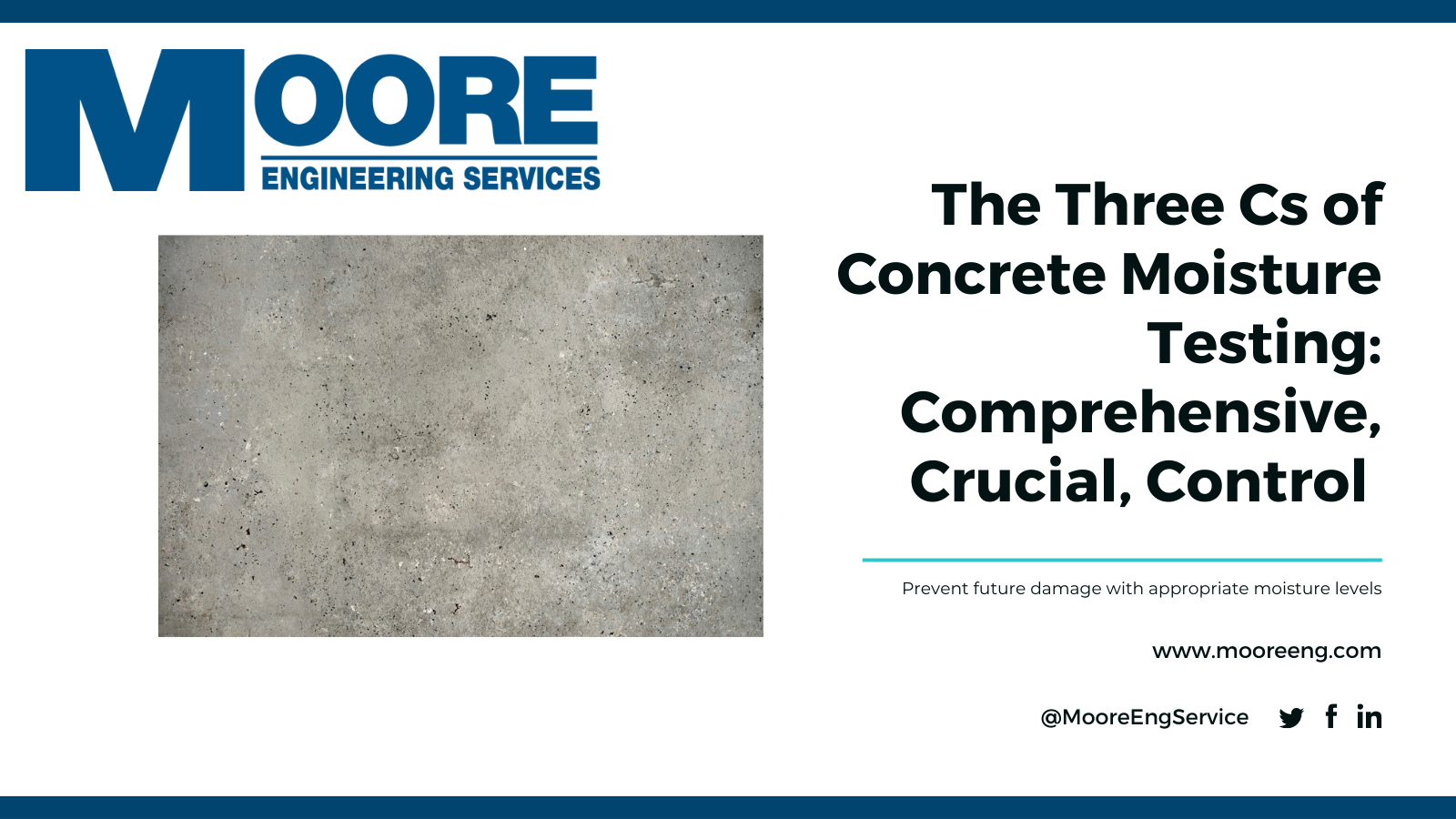
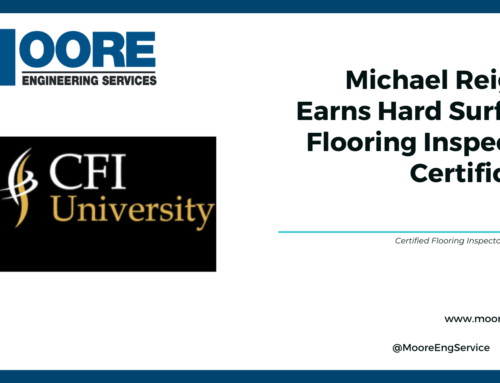
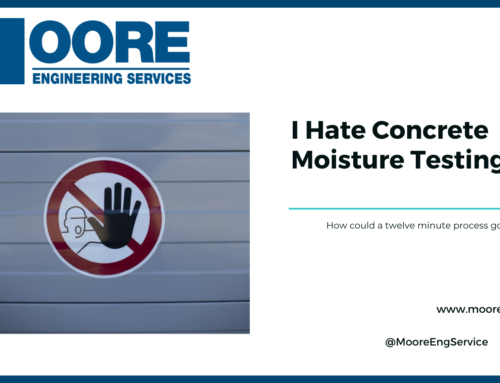
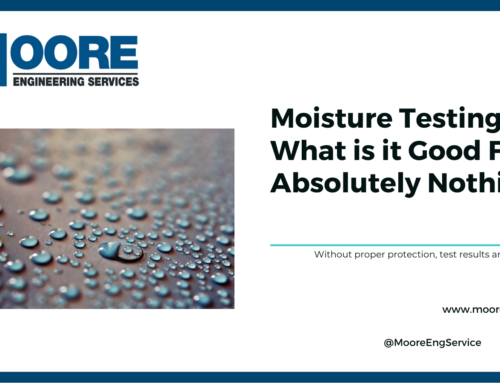
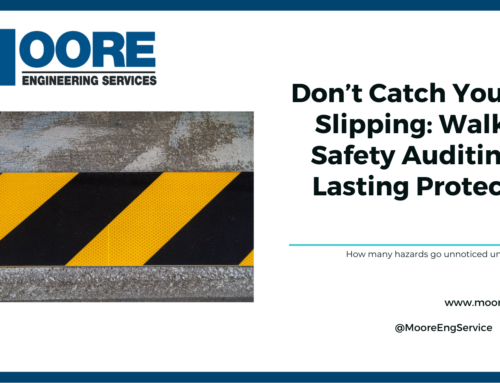
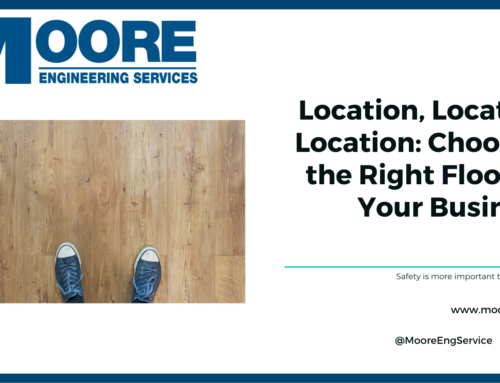
Leave A Comment